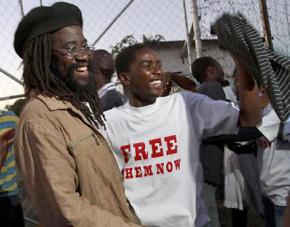Activism sways a Zimbabwe court
reports on the case of six pro-democracy activists in Zimbabwe found guilty on trumped-up charges, but given suspended sentences.
THE GUILTY verdict handed down this week against six Zimbabwean activists outraged their supporters around the globe--but relatively lenient sentencing suggests that international protest had an impact even under Robert Mugabe's dictatorship.
The six activists were part of a group of 45 people arrested more than a year ago in the capital city of Harare after a meeting in which they reportedly showed a video of the mass protests taking place against dictatorship in Egypt and Tunisia.
Initially, the activists faced charges of treason and "subverting a constitutionally elected government"--punishable by a possible death sentence. Many also faced torture and horrific beatings during their initial detention.
After international protests, all but six were eventually released, with the state accusing this group of attempting to foment an uprising against the brutal decades-long regime of Zimbabwe's President Robert Mugabe. They were eventually released on bail, but forced to stand trial.
The Mugabe government, which has been engaged in a crackdown against opposition activists in the run-up to anticipated elections this year would have been happy to see the six activists--Munyaradzi Gwisai (general coordinator of the International Socialist Organization-Zimbabwe), Tafadzwa Antonater Choto, Hopewell Gumbo (former president of the Zimbabwe National Students Union), Welcome Zimuto (of the Zimbabwe National Students Union), Tatenda Mombeyara (of the Zimbabwe Labor Center) and Edson Chakuma (of the United Food and Allied Workers Union)--rot in prison for the maximum sentence of 10 years.

Calling the conviction a setback for freedom of expression in Zimbabwe, Erwin van der Borght, Amnesty International's director for Africa, said in a statement:
The court's decision to convict people who were merely exercising their internationally guaranteed right to freedom of expression is simply shocking. It's a reminder that Zimbabwe is still an unsafe place for activists. This ruling instills fear in anyone defending human rights in Zimbabwe. It is likely to restrict the work of activists in the country, and the convictions should be overturned immediately.
Prosecutor Edmore Nyazambahad argued that the activists should receive the maximum sentence, saying that in Biblical times, they would have been stoned to death.
Comparing Mugabe to the biblical figure of Moses, Nyazamba stated in court, "This case reminds me of that in the Bible, whereby those who revolted against authority were swallowed up when the ground opened up. Their families, including their cats and dogs, were not spared." He continued: "They will repeat the same offence and fine-tune the plan until their motive of toppling the government is fulfilled."
However, international pressure mounted by supporters of the Zimbabwean activists seems to have forced the court to deliver a lesser sentence, including a two-year jail sentence that was suspended on the condition that no similar "crime" is committed in the next five years, 420 hours of community service and a $500 fine.
Any sentence at all is, like the guilty verdict, an injustice. But this is much less than supporters of the six feared.
The sentence was handed down on March 21, the day after activists and unionists rallied and picketed outside of Zimbabwean embassies and missions in Johannesburg, New York City, London, Melbourne, Vienna and Toronto.
In Harare itself, in spite of the regime's record of repression, hundreds of supporters turned out for the sentencing, sending a clear message of solidarity and support.
As long as these activists are unable to exercise their democratic right to dissent against the Mugabe government, the struggle will not be over.


